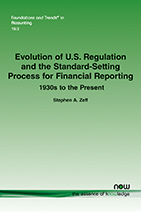Evolution of U.S. Regulation and the Standard-Setting Process for Financial Reporting: 1930s to the Present
By Stephen A. Zeff, Rice University, USA, sazeff@rice.edu
Abstract
Since the 1930s, successive private-sector accounting standard setters in the United States have established, under the oversight of the Securities and Exchange Commission (SEC), “generally accepted accounting principles” for use by public companies. In the early decades, when the standard setter was a committee or board of the American Institute of Certified Public Accountants, and was a part-time body with a slender staff, the SEC intervened actively in its deliberations and in the formulation of its recommended practices. With the coming of the independent, full-time, well-resourced Financial Accounting Standards Board (FASB) in 1973, the SEC’s regard for the standard setter increased, and a climate of mutual respect and consultation prevailed. But beginning in the 1990s, companies and banks strongly opposing the Board’s standards already issued or in prospect increasingly turned to members of Congress for relief, hoping to force the FASB to back down.
This article is a recounting and explanation of the series of episodes from the 1930s to the present on the evolution of the U.S. regulatory and standard-setting process for financial reporting by companies in the private sector. By gathering together all of these events and developments in a single article, it is hoped that researchers will come to appreciate the historical antecedents that have shaped today’s institutional reality for both the SEC and the FASB. An extensive list of references to books, articles, press reports, and other documents has been provided to enable readers to obtain a fuller story of this evolution. An appendix completes the article, containing the first published list of the SEC Chief Accountants from 1935 to the present.
Evolution of U.S. Regulation and the Standard-Setting Process for Financial Reporting: 1930s to the Present
Evolution of U.S. Regulation and the Standard-Setting Process for Financial Reporting: 1930s to the Present surveys and explains the evolution of the stream of events and developments in the regulation and standard setting that have set the requirements for companies’ financial reporting in the U.S. capital market. Particular attention is given to instances in which the SEC, as regulator, has either been in disagreement with the private-sector accounting standard setter, or where they both have partnered in a solution. Attention is also given to some of the more celebrated attempts by self-interested parties, particularly the company sector, to interpose themselves forcefully into the standard-setting process. The interventions from members of Congress on behalf of the company sector are also the object of study. In this rendering of the evolution, the author has endeavored to provide extensive references to the published literature to enable readers to study the events and developments in greater depth.
